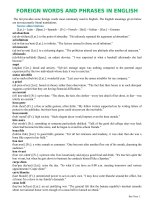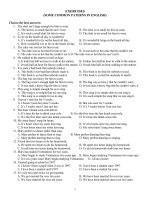errors in English
Bạn đang xem bản rút gọn của tài liệu. Xem và tải ngay bản đầy đủ của tài liệu tại đây (178.47 KB, 14 trang )
A.D.
A.D.” does not mean “after death,” as many people suppose. “B.C.” stands for the English
phrase “before Christ,” but “A.D.” stands confusingly for a Latin phrase: anno domini (“in
the year of the Lord”—the year Jesus was born). If the calendar actually changed with
Jesus’ death, then what would we do with the years during which he lived? Since Jesus was
probably actually born around 6 B.C. or so, the connection of the calendar with him can be
misleading.
Many Biblical scholars and historians, and archeologists prefer the less sectarian
designations “before the Common Era” (B.C.E.) and “the Common Era” (C.E.).
All of these abbreviations can also be spelled without their periods.
AM/PM
AM” stands for the Latin phrase Ante Meridiem —which means “before noon”—and “PM”
stands for Post Meridiem : “after noon.” Although digital clocks routinely label noon
“12:00 PM” you should avoid this expression not only because it is incorrect, but because
many people will imagine you are talking about midnight instead. The same goes for
“12:00 AM.” Just say or write “noon” or “midnight” when you mean those precise times.
It is now rare to see periods placed after these abbreviations: “A.M.” , but in formal writing
it is still preferable to capitalize them, though the lower-case “am” and “pm” are now so
popular they are not likely to get you into trouble.
Occasionally computer programs encourage you to write “AM” and “PM” without a space
before them, but others will misread your data if you omit the space. The nonstandard habit
of omitting the space is spreading rapidly, and should be avoided in formal writing.
ABLE TO
People are able to do things, but things are not able to be done: you should not say, “the
budget shortfall was able to be solved by selling brownies.”
ACCENT MARKS
In what follows, “accent mark” will be used in a loose sense to include all diacritical marks
that guide pronunciation. Operating systems and programs differ in how they produce
accent marks, but it’s worth learning how yours works. Writing them in by hand afterwards
looks amateurish.
Words adopted from foreign languages sometimes carry their accent marks with them, as in
“fiancé, ” “protégé,” and “cliché.” As words become more at home in English, they tend to
shed the marks: “Café” is often spelled “cafe.” Unfortunately, “résumé” seems to be losing
its marks one at a time (see under “vita/vitae”).
Many computer users have not learned their systems well enough to understand how to
produce the desired accent and often insert an apostrophe (curled) or foot mark (straight)
after the accented letter instead: “cafe'.” This is both ugly and incorrect. The same error is
commonly seen on storefront signs.
So far we’ve used examples containing acute (right-leaning) accent marks. French and
Italian (but not Spanish) words often contain grave (left-leaning) accents; in Italian it’s a
caffè. It is important not to substitute one kind of accent for the other.
The diaeresis over a letter signifies that it is to be pronounced as a separate syllable: “noël”
and “naïve” are sometimes spelled with a diaeresis, for instance. The umlaut, which looks
identical, modifies the sound of a vowel, as in German Fräulein (girl), where the accent
mark changes the “frow” sound of Frau (woman) to “froy.” Rock groups like “Blue Öyster
Cult” scattered umlauts about nonsensically to create an exotic look.
Spanish words not completely assimilated into English like piñata and niño retain the tilde,
which tells you that an “N” is to be pronounced with a “Y” sound after it.
In English-language publications accent marks are often discarded, but the acute and grave
accents are the ones most often retained.
ALTOGETHER/ALL TOGETHER
“Altogether” is an adverb meaning “completely,” “entirely.” For example: “When he first
saw the examination questions, he was altogether baffled.” “All together,” in contrast, is a
phrase meaning “in a group.” For example: “The wedding guests were gathered all together
in the garden.” Undressed people are said in informal speech to be “in the altogether”
(perhaps a shortening of the phrase “altogether naked” ).
AUTOBIOGRAPHY/BIOGRAPHY
When you write the story of your own life, you write an autobiography; but when you
write the story of someone else’s life, it’s just a plain old biography.
e.g./i.e.
When you mean “for example,” use e.g. It is an abbreviation for the Latin phrase exempli
gratia. When you mean “that is,” use “i.e.” It is an abbreviation for the Latin phrase id est.
Either can be used to clarify a preceding statement, the first by example, the second by
restating the idea more clearly or expanding upon it. Because these uses are so similar, the
two abbreviations are easily confused. If you just stick with good old English “for
example” and “that is” you won’t give anyone a chance to sneer at you. If you insist on
using the abbreviation, perhaps “example given” will remind you to use “e.g.,” while “in
effect” suggests “I.E.”
Since e.g. indicates a partial list, it is redundant to add “etc.” at the end of a list introduced
by this abbreviation.
FARTHER/FURTHER
Some authorities (like the Associated Press) insist on “farther” to refer to physical distance
and on “further” to refer to an extent of time or degree, but others treat the two words as
interchangeable except for insisting on “further” for “in addition,” and “moreover.” You’ll
always be safe in making the distinction; some people get really testy about this.
IN SPITE OF/ DESPITE
Although “in spite of” is perfectly standard English, some people prefer “despite” because
it is shorter. Be careful not to mix the two together by saying “despite of” except as part of
the phrase “in despite of” meaning “in defiance of.”
And note that unlike “despite,” “in spite” should always be spelled as two separate words.
UFO
“UFO” stands for “Unidentified Flying Object,”so if you’re sure that silvery disk is an
alien spacecraft, there’s no point in calling it a "UFO.” I love the sign I once saw in a
Seattle bookstore labeling the alien-invasion section: “Incorrectly Identified Flying
Objects."
XMAS/CHRISTMAS
“Xmas” is not originally an attempt to exclude Christ from Christmas, but uses an
abbreviation of the Greek spelling of the word “Christ” with the “X” representing the
Greek letter chi. However, so few people know this that it is probably better not to use this
popular abbreviation in religious contexts.
Non-Errors
(Those usages people keep telling you are wrong but which are actually standard in
English.)
Split infinitives
For the hyper-critical, “to boldly go where no man has gone before” should be “to go
boldly. . . .” It is good to be aware that inserting one or more words between “to” and a
verb is not strictly speaking an error, and is often more expressive and graceful than
moving the intervening words elsewhere; but so many people are offended by split
infinitives that it is better to avoid them except when the alternatives sound strained and
awkward.
Ending a sentence with a preposition
A fine example of an artificial “rule” which ignores standard usage. The famous witticism
usually attributed to Winston Churchill makes the point well: “This is the sort of English
up with which I will not put.” see The American Heritage Book of English Usage. Jack
Lynch has some sensible comments on this issue. If you think you know the original
version of this saying, click here.
Beginning a sentence with a conjunction
It offends those who wish to confine English usage in a logical straitjacket that writers
often begin sentences with “and” or “but.” True, one should be aware that many such
sentences would be improved by becoming clauses in compound sentences; but there are
many effective and traditional uses for beginning sentences thus. One example is the reply
to a previous assertion in a dialogue: “But, my dear Watson, the criminal obviously wore
expensive boots or he would not have taken such pains to scrape them clean.” Make it a
rule to consider whether your conjunction would repose more naturally within the previous
sentence or would lose in useful emphasis by being demoted from its position at the head
of a new sentence.
Using “between” for only two, “among” for more
The “-tween” in “between” is clearly linked to the number two; but, as the Oxford English
Dictionary notes, “In all senses, between has, from its earliest appearance, been extended to
more than two.” We’re talking about Anglo-Saxon here—early. Pedants have labored to
enforce “among” when there are three or more objects under discussion, but largely in vain.
Even the pickiest speaker does not naturally say, “A treaty has been negotiated among
England, France, and Germany.”
Over vs. more than.
Some people claim that “over” cannot be used to signify “more than,” as in “Over a
thousand baton-twirlers marched in the parade.” “Over,” they insist, always refers to
something physically higher: say, the blimp hovering over the parade route. This absurd
distinction ignores the role metaphor plays in language. If I write 1 on the blackboard and
10 beside it, 10 is still the “higher” number. “Over” has been used in the sense of “more
than” for over a thousand years.
Gender vs. sex
Feminists eager to remove references to sexuality from discussions of females and males
not involving mating or reproduction revived an older meaning of “gender,” which had
come to refer in modern times chiefly to language, as a synonym for “sex” in phrases such
as “Our goal is to achieve gender equality.” Americans, always nervous about sex, eagerly
embraced this usage, which is now standard. In some scholarly fields, “sex” is now used to
label biologically determined aspects of maleness and femaleness (reproduction, etc.) while
“gender” refers to their socially determined aspects (behavior, attitudes, etc.); but in
ordinary speech this distinction is not always maintained. It is disingenuous to pretend that
people who use “gender” in the new senses are making an error, just as it is disingenuous
to maintain that “Ms.” means “manuscript” (that’s “MS”). Nevertheless, I must admit I was









